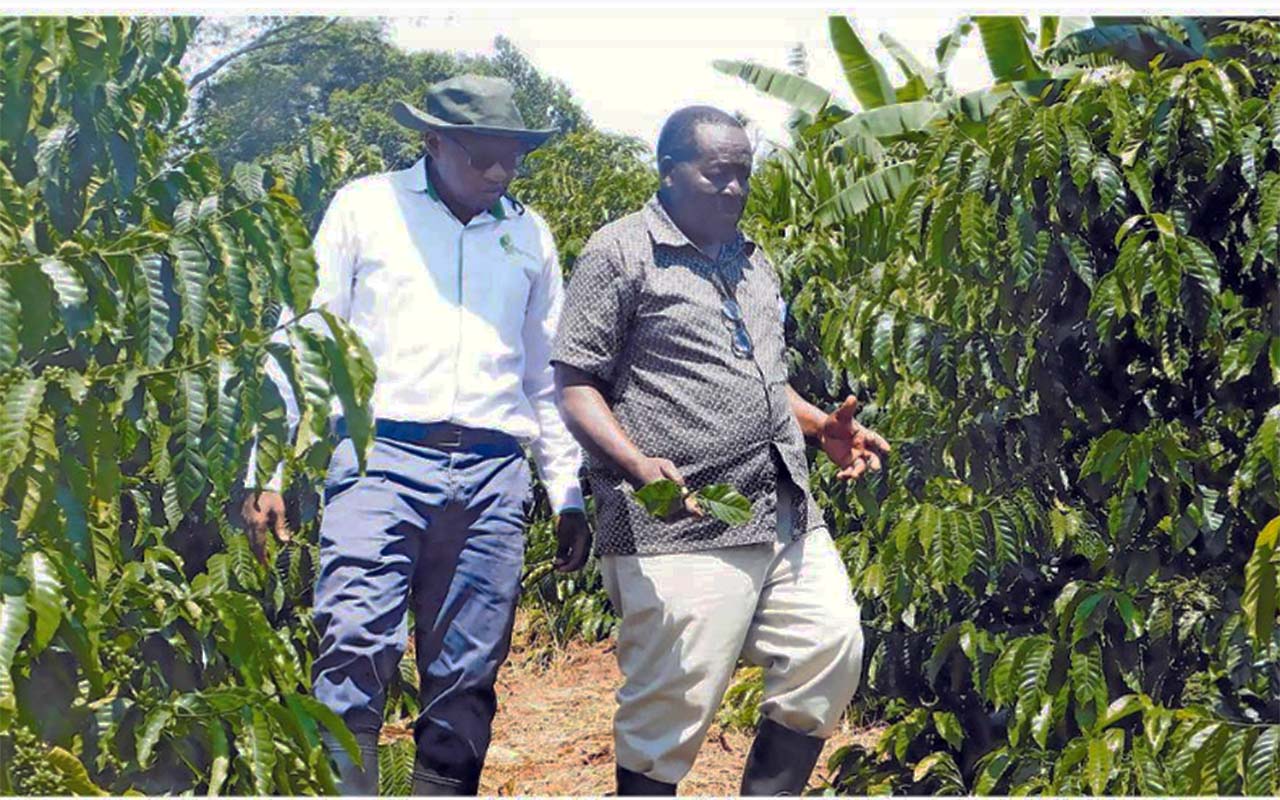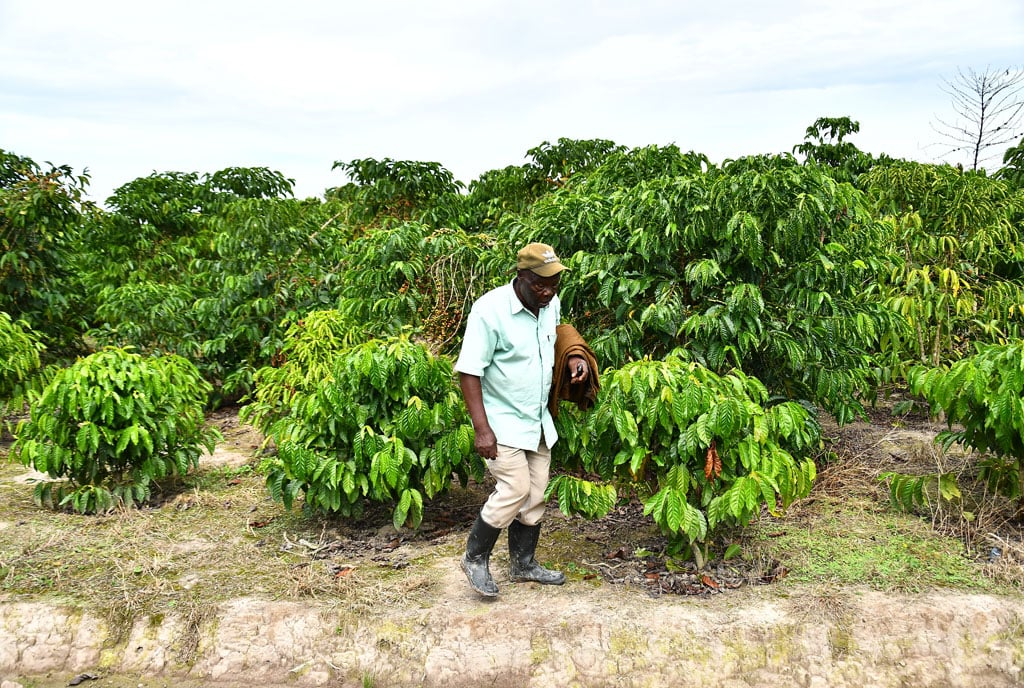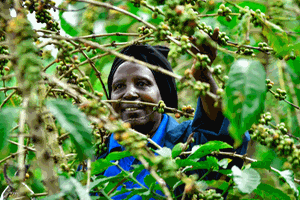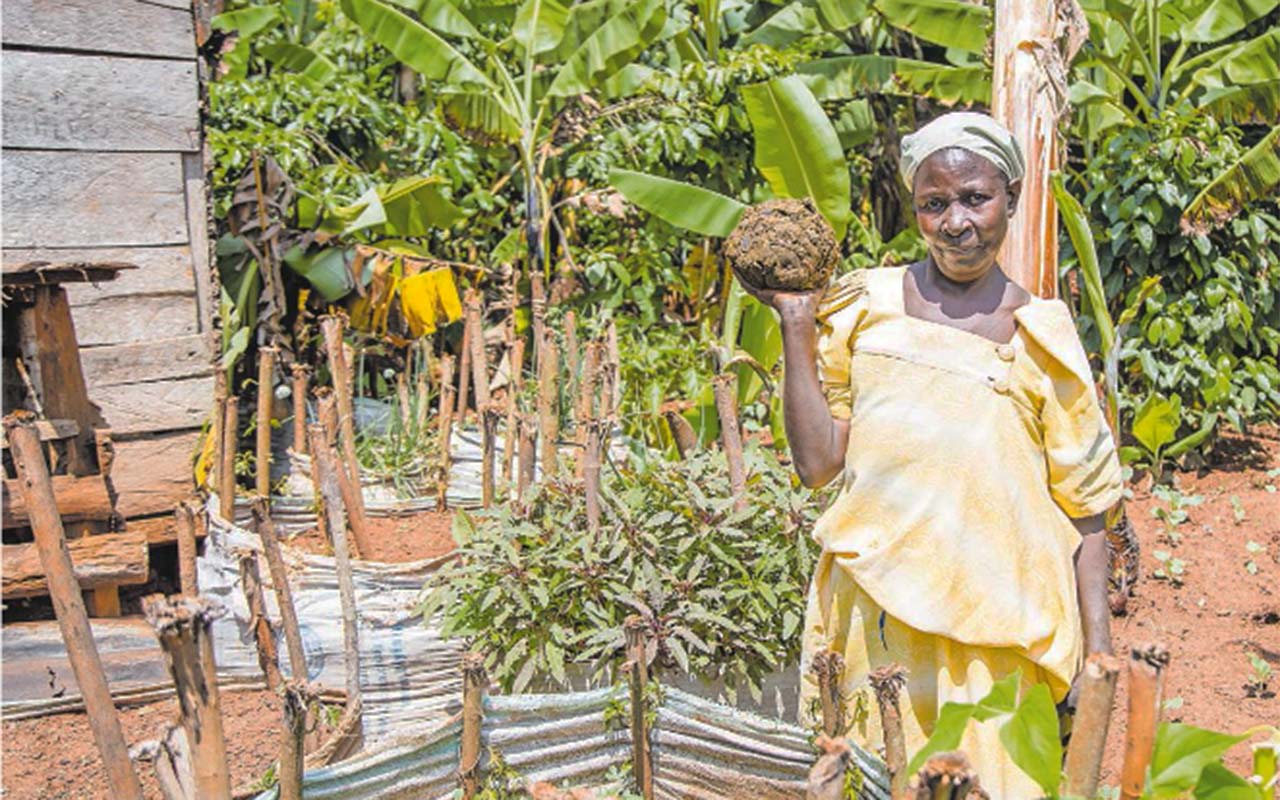
Brian Lwetutte (left) and Lawrence Majwala take a walk in Majwala’s coffee garden declared 100 percent EURD compliant. Photo/Michael J Ssali
Coffee production and its export are very much debated topics today in Uganda. We are fortunate to be among the leading producers of coffee, which is the most traded agricultural commodity in the world.
Coffee production and its export are very much debated topics today in Uganda. We are fortunate to be among the leading producers of coffee, which is the most traded agricultural commodity in the world.
As the coffee crop gains higher value and more significance in the economic development of the country, more and more attention is being given to the coffee production industry, and there is greater interest among farmers to grow more coffee. Virgin land is being cleared to create space for growing the crop. It has also been observed that some people are cutting down trees and forests to grow coffee, which is not recommended in today’s times of climate change mitigation.
Purpose of EUDR
Europe, which buys about 60 percent of our coffee, is concerned about the degradation and cutting down of forests as farmers attempt to create space for growing crops such as cocoa, coffee, soybean, and palm oil. This is what led the European Union parliament to approve a regulation referred to as the European Union Deforestation Regulation (EUDR) in December 2022. It bans the importation into Europe of crops such as cocoa, soybean, coffee, palm oil, and animal products farmed on land where forests and trees have been cut down to grow the crops.
Europe will only buy deforestation-free products, and it will ensure that all supply chains remain free from products that cause deforestation. The EUDR entered into force on June 29, 2023, and will enter into application on December 31, 2024 (18 months’ transition) and on June 30, 2025 (24 months’ transition) for micro- and small enterprises. Europe apparently wants to use the new regulation as proof that it is committed to climate change mitigation.
Efforts to Fulfilment
The EUDR deadline of December 31, 2024, is not so far away, and now the Government of Uganda and the farmers are working towards fulfilment of the conditions. In different parts of the country, farmers and government agents have been engaged in seminars and consultative meetings seeking to get the coffee growers and their gardens registered.
Registration of all coffee farmers is a legal requirement actually mentioned in the Coffee Act, 2021. The National Coffee Act 2021 also provides for the establishment of a national register for all coffee value chain actors. The EUDR has, in a way, arrived to improve what had already been set to be carried out in Uganda—to streamline coffee production by registering all coffee farmers and capturing their geographical location.
Most of Uganda’s coffee is shipped to the European Union member states such as Italy, Germany, Spain, Belgium, Portugal, Russia, Switzerland, Sweden, and the Netherlands, making the EU the primary export market for Ugandan coffee. They insist on extremely hygienic handling of the crop and farming practices that don’t degrade the natural environment.
As producers, apart from observing the EUDR, farmers are expected to ensure that the crop does not have any foreign matter, black beans, or any other degrading material. There is therefore a big need to trace the crop from the garden where it is produced throughout the entire value chain points until it arrives in the importing EU country.
The Technology is Here
Brian Lwetutte, chief executive officer of Agriyields, an agricultural technology and innovation company, says it is important for all farmers and farmers' groups to devise a digital tool for monitoring all farmers’ activities right from their various gardens and to ensure they are paying attention to climate change mitigation measures.
“It should be done in such a way that when the gardens are digitised, the products are marked with a QR Code or digital export stamp for everyone along the export route to be sure they meet 100 percent EUDR compliance,” says Lwetutte.
“This is easy for anybody with a smartphone or any other such device to get the details from the digital export stamp.” The company he heads has the capacity to provide the necessary technical assistance to farmers’ cooperative societies and farmers groups to come up with the farm digitisation or traceability app in order for them to easily export their products to Europe and wherever else across the globe.
How the App Operates
On Friday last week, Lwetutte was in Masaka at the coffee farm of Mr Lawrence Majwala, an executive member of Masaka Cooperative Union, to showcase his company’s geo-mapping skills. The technology informs the farmer about the acreage of his garden, and it digitally exposes the farmer’s activities to coffee buyers and other stakeholders along the value chain, including information on climate change mitigation measures taken on that farm, such as tree planting or tree preservation.
“It is also possible to tell whether some trees were cut down three years or so ago,” he disclosed. At the end of the visit to Majwala’s farm, Lwetutte was able to confirm that the farm is 100 percent EUDR compliant. “Agriyields can also provide climate and weather forecasts to farmers. We can make it possible for them to use their mobile phones to ascertain the weather conditions of the coming days,” he said.
“For example, according to my phone, tomorrow it will not rain in this part of Masaka where we are right now.” Indeed, it turned out that it did not rain the following day. “We can also do remote soil testing and advise farmers on what fertilisers to use, which quality seeds are available, and where they can purchase them from.”
Agriyields further helps farmers to access credit finance. It can also make a credible estimate of the annual production capacity of the garden. This will make it possible to detect fraud if the farmer ends up purchasing extra coffee from non-EUDR compliant farmers to sell it on their behalf.
Lwetutte and his team have visited Kalangala District and met farmer groups' leaders about adopting digital traceability and other innovations, and he is visiting several other districts to showcase his private-sector-led solutions to existing problems in the farming sector. He was set to meet other farmers in Luwero District after the Masaka trip last week.

Lawrence Majwala planted a coffee tree to mark the end of UCDA. Photo/Michael J Ssali
Majwala’s Mixed Farm
Lawrence Majwala, a trained agriculturist, grows a variety of crops apart from coffee, including vanilla, Hass avocado, maize, banana, and cassava, on a piece of land measuring over three acres at Kisagazi Village, Mukungwe Sub-county, Masaka District. He also keeps poultry, pigs, and goats.
“At my age of 80 years, I need a lot of money, and my strategy is to have a variety of enterprises so that during the months when there is no money from coffee, I can sell maize or any other crop on the farm. It is the reason I also keep livestock such as pigs, poultry, and goats,” said Majwala. He mainly uses livestock manure to boost crop production on his farm, and he was credited with sustaining agricultural hygiene and tree preservation all over the gardens—well-pruned crops and good weed control.
He is disappointed that the Uganda Coffee Development Authority (UCDA) has been taken over by the Ministry of Agriculture, and he is rather skeptical about its future performance in the promotion of coffee production. “As an institution, it had its imperfections, but these are issues that could be rectified,” he told Seeds of Gold.
As a long-time reminder of the end of UCDA, Majwala has planted a coffee tree on his farm. “I planted it right on the day parliament passed the Bill to close it down. It will always be a reminder to me that there was once an institution known as UCDA.”
About EUDR
In December 2022, the European Union parliament approved a regulation referred to as the European Union Deforestation Regulation (EUDR). The EUDR bans the importation into Europe of crops such as cocoa, soybean, coffee, palm oil, and animal products farmed on land where forests and trees have been cut down to grow the crops.






